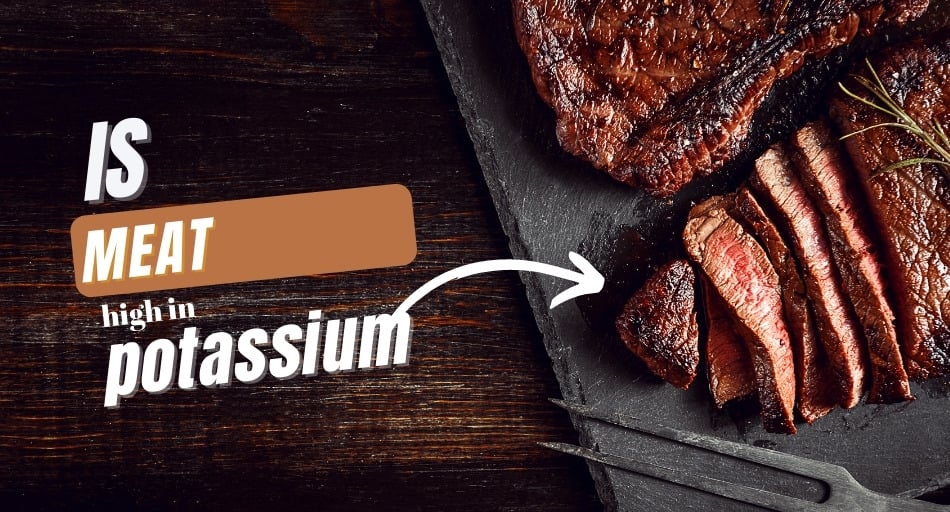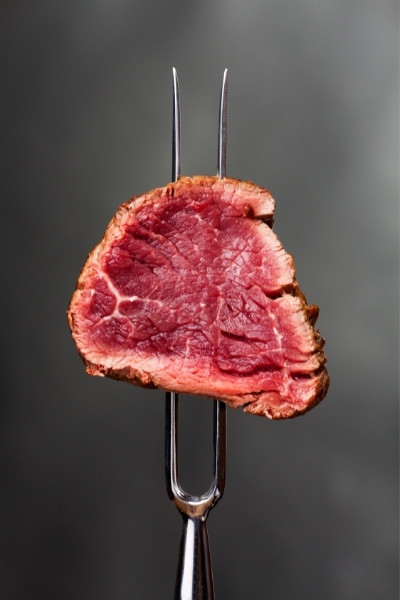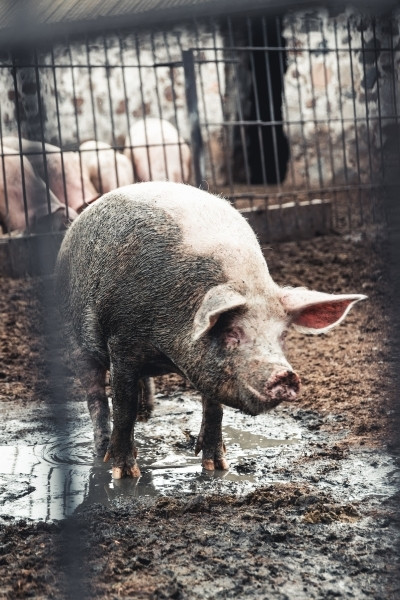Meat is a major source of protein and other nutrients which may include potassium. There are several sources of meat like beef, mutton or lamb, pork, and poultry. They are all good sources of potassium.

Table of Contents
Is Meat High in Potassium?
Meat contains a considerable amount of potassium. Meat is digested into amino acids which are chemical compounds. Amino acids are made of carbon, nitrogen, oxygen, hydrogen, phosphorus, and potassium.
The potassium content in meat may depend on the type of meat. For example, beef has a higher potassium content than chicken. Pork and lamb have a higher potassium content than poultry.
Can You Check Your Potassium Level at Home?
How Much Potassium is in Meat?
Meat contains a considerable amount of potassium. A 3.5-ounce serving of meat can provide up to 320 milligrams of potassium.
Different types of meat provide different amounts of potassium. For example, a 3.5-ounce serving of beef can provide up to 320 milligrams of potassium, a 3.5-ounce serving of pork can provide up to 420 milligrams of potassium, and a 3.5-ounce serving of chicken can provide up to 223 milligrams of potassium, according to USDA.

The amount of potassium will also depend on what the animal eats. If the animal feed on supplements with a high level of potassium, it will be reflected on the meat.
Health Benefits of Meat
Meat is a good source of many nutrients and plays very important roles in our bodies which include;
Source of Potassium
Potassium is needed by the body to carry out so many functions. It helps to maintain fluid balance through osmoregulation.
This happens in the cells by adjusting the amount of water that leaves and enters the cells. Potassium also helps to regulate the electrical activity of the heart.
The potassium ion pump in the nervous system helps to send electrical signals throughout the body. Potassium also helps in the release of energy in the body by activating the ATP(adenosine triphosphate) molecule which is the form in which energy is stored in the body.
Also, the potassium ion channel helps to regulate insulin secretion by the pancreas.
Meat is a good source of protein
The body uses proteins to build and repair tissues. Proteins are also needed to make enzymes, hormones, and other important chemicals in the body.
Meat is a complete source of protein which means it contains all the essential amino acids that the body needs. The essential amino acids cannot be made by the body and must be obtained from food.

Meat is a good source of iron
Iron is needed by the body to carry out so many functions. It helps to form red blood cells which carry oxygen throughout the body.
Iron also helps to make enzymes and other important chemicals in the body. Meat is a good source of heme iron which is the most easily absorbed form of iron.
Meat is a good source of zinc
Zinc is needed by the body to carry out so many functions. It helps to form proteins that are needed for growth and repair.
Zinc also helps to make enzymes and other important chemicals in the body. Meat is a good source of zinc.
Meat also helps in body cell repair and replacement. As meat is a good source of protein, it helps in repairing and replacement of body cells.
When a person is injured, the body's cells are broken down and proteins are needed to repair them. Proteins are also needed to build new cells.
Meat provides energy
The body uses carbohydrates, fats, and proteins to produce energy. Protein is used to produce the most amount of energy. A 3-ounce serving of meat can provide up to 360 calories.
In the absence of fats and carbohydrates, the body metabolizes proteins to produce energy. Excess amino acids are converted into glucose and stored in the body to be used when needed.
As meat is a good source of zinc, it helps in brain function. Zinc is needed by the body to make proteins that are important for brain function.

These proteins help to keep the brain healthy and functioning properly. Without good brain function, a person can have problems with thinking, learning, and making decisions.
Helps in weight management
Protein helps to build muscle and lose fat. When a person has more muscle, they burn more calories even when they are at rest. Iron is needed by the body to carry out so many functions.
It helps in the production of energy and also helps to transport oxygen from the lungs to the rest of the body. A lack of iron can lead to fatigue and problems with weight loss.
Downsides of Eating Meat
Of course, eating meat also has many well-known downsides. Here are the top 10 health concerns linked to meat consumption:
- Heart Disease
- Cancer
- Stroke
- Diabetes
- Obesity
- Harmful Cholesterol
- Acne
- Erectile Dysfunction
- Alzheimer’s Disease
- Shorter Lifespan

Not to mention the suffering of BILLIONS of animals around the world, each year.
Is Meat Good For People With Kidney Disease
Meat is not considered safe for people with kidney diseases. This is because the meat is a bit high in potassium and people with kidney diseases are not able to excrete the potassium from their bodies.
Also, meat releases a lot of amino acids which are eliminated from the body through the kidneys. This can put a lot of stress on the kidneys and can cause further damage.
People with kidney diseases should eat other protein sources such as nuts, legumes, and tofu. These foods are low in potassium and do not release as many amino acids into the body. Before considering to include meat in their diet, it is good for them to consult their doctor.
Conclusion
So, meat is a good source of protein, iron, zinc, and other important nutrients for the body. It helps in repairing and replacement of body cells, brain function, weight management, and many other important functions.
However, meat is not safe for people with kidney diseases. People with kidney diseases should consult their doctor before considering including meat in their diet.
Don't know which foods are high in potassium? Read our article, 15 Best Food Sources of Potassium. We also have a guide to this important mineral: Potassium 101: All You Need To Know About Potassium.
